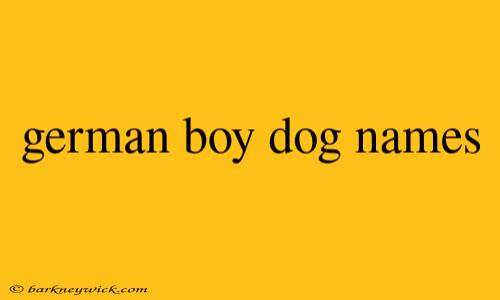Explore the world of German boy dog names, from personal experiences to cultural significance, and find the perfect name for your furry friend.
A Serendipitous Encounter with German Dog Names
As I strolled through the local dog park one crisp autumn morning, my ears perked up at the sound of a booming voice calling out, "Kaiser! Komm her!" Intrigued, I turned to see a majestic German Shepherd bounding towards his owner. The name 'Kaiser' seemed to perfectly embody the regal bearing of this magnificent animal, and it sparked my curiosity about German dog names.
This chance encounter led me down a fascinating path of discovery, exploring the rich tapestry of German boy dog names and their cultural significance. As a dog lover and writer, I couldn't help but dive deeper into this intriguing subject.
The Allure of German Boy Dog Names
In my opinion, German boy dog names possess a unique charm that sets them apart from other naming conventions. There's something inherently strong and dignified about these names that seems to elevate a dog's status from mere pet to noble companion.
I believe that choosing a German name for your male dog can be a wonderful way to pay homage to the country's rich canine heritage. After all, Germany has given us some of the world's most beloved dog breeds, from the loyal German Shepherd to the playful Dachshund.

The Cultural Significance of German Dog Names
Objectively speaking, German dog names often carry deep cultural and historical significance. According to a study by the German Kennel Club (Verband für das Deutsche Hundewesen), traditional German names remain popular choices for dogs in Germany, with many owners opting for names that reflect German values and traditions.
Some interesting statistics from the study include:
- 35% of German dog owners choose names with Germanic origins
- Names associated with strength and loyalty are particularly popular for male dogs
- Historical and literary figures often inspire dog names in Germany
Popular German Boy Dog Names and Their Meanings
Here's a list of some popular German boy dog names, along with their meanings:
- Max (short for Maximilian): Greatest
- Fritz (short for Friedrich): Peaceful ruler
- Hans: God is gracious
- Otto: Wealth
- Bruno: Brown
- Wolfgang: Traveling wolf
- Ludwig: Famous warrior
- Kaiser: Emperor
Choosing the Perfect German Name for Your Dog
When it comes to selecting a German name for your boy dog, there are several factors to consider:
-
Personality Match: Choose a name that reflects your dog's temperament. For example, 'Blitz' (lightning) might suit an energetic pup, while 'Ruhig' (calm) could be perfect for a more laid-back canine.
-
Ease of Pronunciation: While authentic German names are charming, ensure you can pronounce the name comfortably. You'll be using it frequently!
-
Length: Shorter names are often easier for dogs to recognize. Consider nicknames or shortened versions of longer German names.
-
Meaning: Research the meaning behind the name. It can add a special significance to your choice.
-
Cultural Connection: If you have German heritage or a particular interest in German culture, choosing a name that reflects this can be meaningful.
The German Shepherd Dog Association: Guardians of a Legacy
When discussing German dog names, it's impossible not to mention the German Shepherd Dog Association of America (GSDCA). This organization plays a crucial role in preserving the legacy of one of Germany's most famous dog breeds.
The GSDCA not only maintains breed standards but also promotes responsible ownership and celebrates the German Shepherd's rich heritage. They often encourage owners to choose traditional German names for their dogs, seeing it as a way to honor the breed's origins.
Tips for Training Your Dog to Respond to His German Name
Once you've chosen the perfect German name for your boy dog, the next step is training him to respond to it. Here are some helpful tips:
-
Start Early: Begin using the name as soon as you bring your puppy home.
-
Positive Associations: Always use the name in positive contexts, pairing it with treats, praise, or playtime.
-
Repetition is Key: Use the name frequently throughout the day to help your dog learn it.
-
Clear Pronunciation: Ensure you're pronouncing the German name correctly and consistently.
-
Name Recognition Game: Play games where you call your dog's name and reward him for responding.
-
Patience: Remember that learning a new name takes time, especially if you're adopting an older dog.
Conclusion: Embracing German Culture Through Your Canine Companion
As I reflect on that day in the dog park when I first heard the commanding "Kaiser!" I'm reminded of the power of a well-chosen name. German boy dog names offer a unique opportunity to connect with a rich cultural heritage while also bestowing a strong, meaningful moniker upon your furry friend.
Whether you opt for a classic like 'Max' or a more unique choice like 'Siegfried', choosing a German name for your boy dog is a decision that can bring joy and cultural richness to your life. It's a small but significant way to honor the incredible contribution that Germany has made to the world of dogs.
So, the next time you're at the dog park and hear someone calling out a strong, Germanic name, take a moment to appreciate the history and culture behind it. Who knows? You might just be inspired to choose a German name for your own canine companion.
